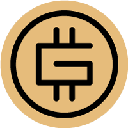-
 Bitcoin
Bitcoin $84,446.8691
-0.35% -
 Ethereum
Ethereum $1,584.3183
-0.40% -
 Tether USDt
Tether USDt $0.9999
0.04% -
 XRP
XRP $2.0613
-0.41% -
 BNB
BNB $594.2997
0.54% -
 Solana
Solana $133.1097
-0.45% -
 USDC
USDC $1.0000
0.01% -
 Dogecoin
Dogecoin $0.1565
0.69% -
 TRON
TRON $0.2422
-2.58% -
 Cardano
Cardano $0.6169
-0.71% -
 UNUS SED LEO
UNUS SED LEO $9.0466
0.05% -
 Chainlink
Chainlink $12.5294
0.56% -
 Avalanche
Avalanche $18.9101
-1.38% -
 Toncoin
Toncoin $2.9957
0.47% -
 Stellar
Stellar $0.2414
0.96% -
 Shiba Inu
Shiba Inu $0.0...01213
3.18% -
 Hedera
Hedera $0.1642
1.82% -
 Sui
Sui $2.1093
0.08% -
 Bitcoin Cash
Bitcoin Cash $341.6052
1.86% -
 Polkadot
Polkadot $3.6922
1.29% -
 Litecoin
Litecoin $76.0142
1.08% -
 Hyperliquid
Hyperliquid $16.3822
-0.96% -
 Dai
Dai $1.0000
-0.01% -
 Bitget Token
Bitget Token $4.4161
1.35% -
 Ethena USDe
Ethena USDe $0.9991
0.01% -
 Pi
Pi $0.6188
-0.03% -
 Monero
Monero $216.7667
0.25% -
 Uniswap
Uniswap $5.1596
-0.40% -
 Pepe
Pepe $0.0...07195
0.00% -
 OKB
OKB $50.3397
-0.57%
What is community governance and how to participate in it?
Community governance in crypto allows members to influence project direction through voting on proposals, often facilitated by DAOs and governance tokens.
Apr 14, 2025 at 12:14 pm
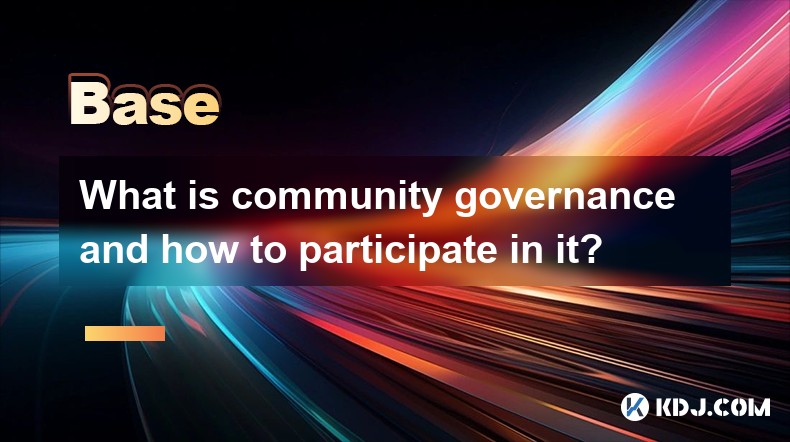
Community governance in the cryptocurrency space refers to the process by which members of a blockchain project or a decentralized organization collectively make decisions that affect the direction and operation of the project. This form of governance is crucial as it empowers the community to have a say in the project's development, ensuring that it aligns with the collective vision and needs of its users. Participating in community governance allows individuals to influence the project's future, propose changes, and vote on critical decisions, making it an essential aspect of decentralized systems.
Understanding Community Governance
Community governance operates on the principle of decentralization, where power is distributed among the community members rather than being centralized in the hands of a few. This model is often facilitated through the use of governance tokens, which grant holders the right to vote on proposals. The primary goal of community governance is to create a transparent, fair, and inclusive decision-making process that reflects the community's consensus.
In many blockchain projects, community governance is implemented through decentralized autonomous organizations (DAOs). A DAO is a smart contract-based entity that operates autonomously, executing decisions based on the votes of its members. DAOs enable community members to propose, discuss, and vote on various aspects of the project, such as protocol upgrades, funding allocations, and strategic initiatives.
Types of Community Governance Models
There are several models of community governance, each with its unique approach to decision-making. One common model is the on-chain governance model, where voting and decision-making occur directly on the blockchain. This model ensures transparency and immutability, as all votes and decisions are recorded on the blockchain.
Another model is off-chain governance, where discussions and voting take place on external platforms, such as forums or social media. While this model can be more accessible and user-friendly, it may lack the transparency and security of on-chain governance. Hybrid models combine elements of both on-chain and off-chain governance, aiming to leverage the strengths of each approach.
How to Participate in Community Governance
Participating in community governance involves several steps, each crucial for effectively engaging with the project and influencing its direction. Here are the key steps to get started:
Acquire Governance Tokens: Most projects require participants to hold governance tokens to vote on proposals. These tokens can be purchased on cryptocurrency exchanges or earned through participation in the project's ecosystem.
Join the Community: Engage with the project's community through official channels such as Discord, Telegram, or forums. This step is essential for staying informed about upcoming proposals and discussions.
Understand the Governance Process: Each project has its unique governance process. Familiarize yourself with the project's governance documentation, which outlines how proposals are submitted, discussed, and voted on.
Propose and Discuss: If you have an idea or suggestion, you can submit a proposal to the community. Engage in discussions to refine your proposal and gather support from other community members.
Vote on Proposals: Once a proposal is ready for voting, use your governance tokens to cast your vote. Ensure you understand the proposal's implications and vote in line with your vision for the project.
Tools and Platforms for Community Governance
Several tools and platforms facilitate community governance, making it easier for participants to engage with the process. Some popular platforms include:
Snapshot: A decentralized voting platform that allows projects to conduct off-chain votes. Snapshot is user-friendly and integrates with various wallets, making it accessible to a broad audience.
Aragon: A platform that enables the creation and management of DAOs. Aragon provides tools for proposal submission, voting, and execution, streamlining the governance process.
Tally: A governance dashboard that aggregates proposals and voting data from various projects. Tally helps users stay informed about governance activities across multiple ecosystems.
Challenges and Considerations in Community Governance
While community governance offers numerous benefits, it also comes with challenges that participants should be aware of. One significant challenge is voter apathy, where a small percentage of token holders participate in governance, potentially leading to decisions that do not reflect the broader community's views.
Another challenge is sybil attacks, where malicious actors create multiple accounts to influence voting outcomes. Projects often implement measures such as token locking or reputation systems to mitigate these risks.
Ensuring fair representation is also crucial. Projects must design their governance systems to prevent the concentration of power among a few large token holders, ensuring that smaller stakeholders have a voice in the decision-making process.
Best Practices for Effective Participation
To maximize your impact in community governance, consider the following best practices:
Stay Informed: Regularly check the project's official channels for updates on proposals and governance activities. Being well-informed allows you to make educated decisions and contribute meaningfully to discussions.
Engage Actively: Participate in discussions and provide constructive feedback on proposals. Active engagement helps shape the project's direction and fosters a sense of community.
Collaborate with Others: Work with other community members to build consensus around proposals. Collaboration can lead to more robust and widely supported initiatives.
Vote Responsibly: When voting, consider the long-term implications of proposals on the project's health and sustainability. Responsible voting ensures that decisions align with the community's best interests.
Frequently Asked Questions
Q: Can I participate in community governance without holding governance tokens?
A: While holding governance tokens is typically required to vote on proposals, many projects allow non-token holders to participate in discussions and provide feedback. Engaging in these discussions can still influence the community's direction, even if you cannot vote directly.
Q: How can I ensure my proposals are taken seriously by the community?
A: To ensure your proposals are taken seriously, focus on clear communication, thorough research, and addressing the community's needs. Engage with other members to gather support and refine your proposal based on feedback. Demonstrating a deep understanding of the project and its goals can significantly enhance the credibility of your proposal.
Q: What should I do if I disagree with a governance decision?
A: If you disagree with a governance decision, you can express your concerns through community channels and engage in discussions to understand different perspectives. If the decision is implemented and you still disagree, you may consider proposing an alternative solution or, in some cases, choosing to exit the project if it no longer aligns with your values.
Q: How can I protect my privacy while participating in community governance?
A: To protect your privacy, use pseudonymous wallets and avoid sharing personal information in public forums. Some governance platforms offer privacy features, such as anonymous voting, which can help safeguard your identity while participating in the decision-making process.
Disclaimer:info@kdj.com
The information provided is not trading advice. kdj.com does not assume any responsibility for any investments made based on the information provided in this article. Cryptocurrencies are highly volatile and it is highly recommended that you invest with caution after thorough research!
If you believe that the content used on this website infringes your copyright, please contact us immediately (info@kdj.com) and we will delete it promptly.
- The crypto market is experiencing heightened volatility as global economic shifts and regulatory developments take center stage.
- 2025-04-19 00:20:13
- Coinbase Rolls out Significant Upgrades to Its Solana Network Infrastructure, Boosting Transaction Speed and Scalability
- 2025-04-19 00:20:13
- Where Should You Invest $1,000: Hedera (HBAR) or Ripple (XRP)?
- 2025-04-19 00:15:12
- Dogecoin (DOGE) Price in PKR: Apr 18, 2025
- 2025-04-19 00:15:12
- Michael Saylor Drops ‘21 Truths of Bitcoin’ in Viral Tweet
- 2025-04-19 00:10:14
- Shiba Inu (SHIB) Lead Developer Shytoshi Kusama Resurfaces After 3-Week Break, Teasing New Developments
- 2025-04-19 00:10:14
Related knowledge
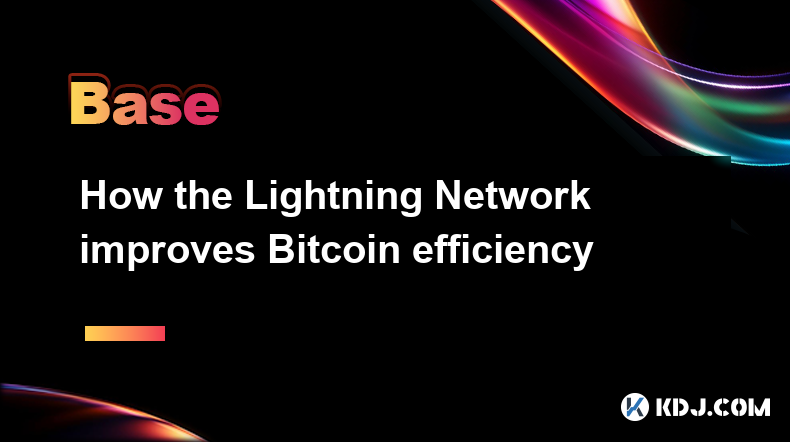
How the Lightning Network improves Bitcoin efficiency
Apr 17,2025 at 08:56pm
The Lightning Network represents a significant advancement in the Bitcoin ecosystem, aiming to address some of the most pressing issues related to transaction speed and cost. By enabling off-chain transactions, the Lightning Network drastically improves Bitcoin's efficiency, allowing for faster and cheaper transactions. This article will explore how the...

Analysis of the KYC process of cryptocurrency exchanges
Apr 17,2025 at 05:07pm
The Know Your Customer (KYC) process is a critical component in the operations of cryptocurrency exchanges. It serves as a regulatory measure to prevent fraud, money laundering, and other illicit activities. KYC procedures are designed to verify the identity of users and ensure compliance with financial regulations. This article delves into the various ...

What does Floor Price mean in the NFT market
Apr 17,2025 at 12:42am
The term Floor Price is a critical concept within the NFT (Non-Fungible Token) market, serving as a key indicator for both buyers and sellers. In essence, the floor price represents the lowest price at which an NFT from a particular collection is currently listed for sale on a marketplace. This price point is crucial for understanding the perceived valu...
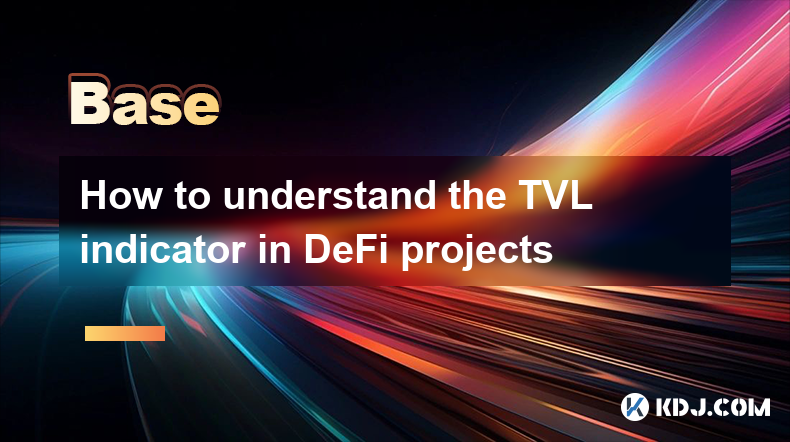
How to understand the TVL indicator in DeFi projects
Apr 17,2025 at 03:28pm
Understanding the TVL indicator in DeFi projects is crucial for investors and enthusiasts looking to gauge the health and popularity of decentralized finance platforms. TVL, or Total Value Locked, represents the total amount of assets that are currently staked or locked in a DeFi protocol. This metric serves as a barometer for the trust and interest tha...

Analysis of the HODL term in digital assets
Apr 18,2025 at 10:28pm
The term HODL has become a cornerstone of the cryptocurrency community, often used with a sense of humor and camaraderie among investors. Originally a typo for 'hold,' HODL has evolved into an acronym standing for 'Hold On for Dear Life.' This article will delve into the origins, significance, and practical implications of HODL within the digital assets...
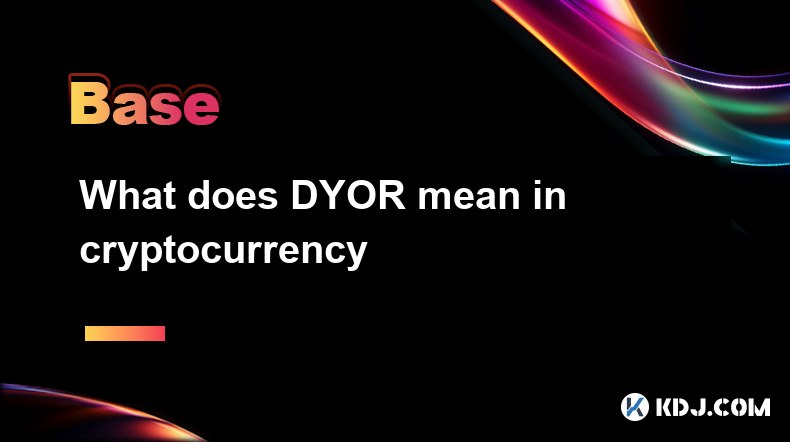
What does DYOR mean in cryptocurrency
Apr 17,2025 at 03:00pm
DYOR, or 'Do Your Own Research,' is a crucial mantra in the cryptocurrency community. It emphasizes the importance of individuals conducting their own thorough investigations before making any investment decisions. In the fast-paced and often volatile world of cryptocurrencies, relying solely on others' advice or the hype surrounding a particular coin c...

How the Lightning Network improves Bitcoin efficiency
Apr 17,2025 at 08:56pm
The Lightning Network represents a significant advancement in the Bitcoin ecosystem, aiming to address some of the most pressing issues related to transaction speed and cost. By enabling off-chain transactions, the Lightning Network drastically improves Bitcoin's efficiency, allowing for faster and cheaper transactions. This article will explore how the...

Analysis of the KYC process of cryptocurrency exchanges
Apr 17,2025 at 05:07pm
The Know Your Customer (KYC) process is a critical component in the operations of cryptocurrency exchanges. It serves as a regulatory measure to prevent fraud, money laundering, and other illicit activities. KYC procedures are designed to verify the identity of users and ensure compliance with financial regulations. This article delves into the various ...

What does Floor Price mean in the NFT market
Apr 17,2025 at 12:42am
The term Floor Price is a critical concept within the NFT (Non-Fungible Token) market, serving as a key indicator for both buyers and sellers. In essence, the floor price represents the lowest price at which an NFT from a particular collection is currently listed for sale on a marketplace. This price point is crucial for understanding the perceived valu...

How to understand the TVL indicator in DeFi projects
Apr 17,2025 at 03:28pm
Understanding the TVL indicator in DeFi projects is crucial for investors and enthusiasts looking to gauge the health and popularity of decentralized finance platforms. TVL, or Total Value Locked, represents the total amount of assets that are currently staked or locked in a DeFi protocol. This metric serves as a barometer for the trust and interest tha...

Analysis of the HODL term in digital assets
Apr 18,2025 at 10:28pm
The term HODL has become a cornerstone of the cryptocurrency community, often used with a sense of humor and camaraderie among investors. Originally a typo for 'hold,' HODL has evolved into an acronym standing for 'Hold On for Dear Life.' This article will delve into the origins, significance, and practical implications of HODL within the digital assets...

What does DYOR mean in cryptocurrency
Apr 17,2025 at 03:00pm
DYOR, or 'Do Your Own Research,' is a crucial mantra in the cryptocurrency community. It emphasizes the importance of individuals conducting their own thorough investigations before making any investment decisions. In the fast-paced and often volatile world of cryptocurrencies, relying solely on others' advice or the hype surrounding a particular coin c...
See all articles






















































































